PwC面试问题
pwc vi面试回答模板

pwc vi面试回答模板在准备PwC VI面试时,了解面试官可能会问到的问题和相应的回答模板是非常重要的。
以下是一些常见的PwC VI面试问题和回答模板,帮助你更好地准备:1. 自我介绍问题:请简要介绍一下你自己。
回答模板:我是XXX,来自XXX。
我毕业于XXX大学,主修XXX专业。
在校期间,我曾参与过XXX项目,获得了XXX经验。
我对XXX领域有浓厚的兴趣,希望能够在PwC发展自己的职业生涯。
2. 为什么选择PwC?问题:你为什么选择PwC作为你的职业发展目标?回答模板:我对PwC的企业文化和声誉非常感兴趣,认为这里是一个充满挑战和发展机会的平台。
同时,PwC在XXX领域的专业知识和经验也让我非常敬佩。
我相信在这里,我可以得到更多的成长机会和学习资源。
3. 团队合作和领导力问题:请分享一个你在团队中成功合作的经历,并阐述你在其中的作用和收获。
回答模板:在我曾经参与的一个XXX项目中,我和团队成员共同完成了XXX任务。
在这个过程中,我与团队成员建立了良好的沟通和合作关系,积极协调资源,解决问题。
最终,我们成功地完成了项目目标,并获得了客户的好评。
这个经历让我深刻地认识到团队合作和领导力的重要性。
4. 解决问题的能力问题:请分享一个你在解决复杂问题方面的经历,并阐述你是如何找到解决方案的。
回答模板:在我曾经参与的一个XXX项目中,我们遇到了一个非常棘手的问题——XXX问题。
在分析问题的过程中,我首先对各种信息进行了梳理和分类,然后利用SWOT分析、PEST分析等方法对问题进行了深入剖析。
最终,我们发现了问题的根源,并采取了有效的措施来解决问题。
这个经历让我学会了如何运用逻辑思维和创造性思维来解决问题。
5. 个人发展和职业规划问题:你未来的职业规划和目标是什么?你计划如何实现这些目标?回答模板:我的职业规划是在XXX领域获得更多的专业知识和实践经验,不断提升自己的能力和素质。
为了实现这个目标,我计划在未来的工作中积极参与项目实践和学习培训,不断提升自己的能力和素质。
pwc vi面 参考答案
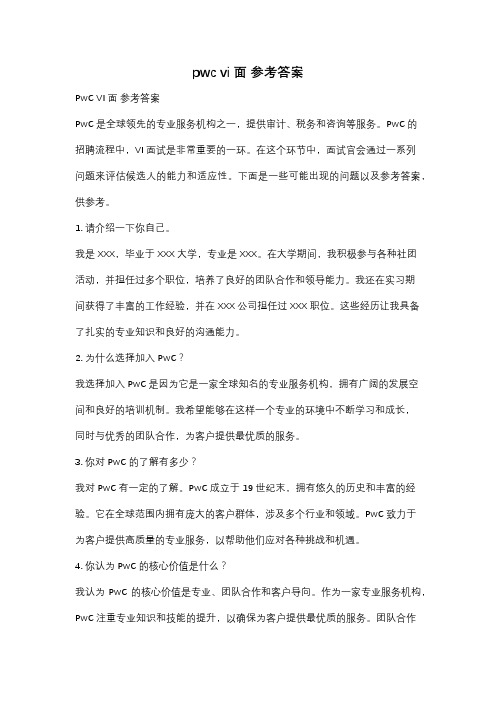
pwc vi面参考答案PwC VI面参考答案PwC是全球领先的专业服务机构之一,提供审计、税务和咨询等服务。
PwC的招聘流程中,VI面试是非常重要的一环。
在这个环节中,面试官会通过一系列问题来评估候选人的能力和适应性。
下面是一些可能出现的问题以及参考答案,供参考。
1. 请介绍一下你自己。
我是XXX,毕业于XXX大学,专业是XXX。
在大学期间,我积极参与各种社团活动,并担任过多个职位,培养了良好的团队合作和领导能力。
我还在实习期间获得了丰富的工作经验,并在XXX公司担任过XXX职位。
这些经历让我具备了扎实的专业知识和良好的沟通能力。
2. 为什么选择加入PwC?我选择加入PwC是因为它是一家全球知名的专业服务机构,拥有广阔的发展空间和良好的培训机制。
我希望能够在这样一个专业的环境中不断学习和成长,同时与优秀的团队合作,为客户提供最优质的服务。
3. 你对PwC的了解有多少?我对PwC有一定的了解。
PwC成立于19世纪末,拥有悠久的历史和丰富的经验。
它在全球范围内拥有庞大的客户群体,涉及多个行业和领域。
PwC致力于为客户提供高质量的专业服务,以帮助他们应对各种挑战和机遇。
4. 你认为PwC的核心价值是什么?我认为PwC的核心价值是专业、团队合作和客户导向。
作为一家专业服务机构,PwC注重专业知识和技能的提升,以确保为客户提供最优质的服务。
团队合作是PwC成功的关键,它鼓励员工之间的合作和交流,以实现共同的目标。
客户导向是PwC的核心理念,它始终以客户的需求为中心,努力为客户创造价值。
5. 你在团队中遇到过的挑战是什么?你是如何解决的?在之前的团队项目中,我们面临了时间紧迫和任务繁重的挑战。
为了解决这个问题,我首先与团队成员进行了充分的沟通,明确每个人的角色和责任。
然后,我制定了详细的计划和时间表,以确保任务按时完成。
在整个过程中,我与团队成员保持紧密的合作和协调,及时解决问题和调整计划。
最终,我们成功地完成了项目,并得到了客户的认可。
PwC 的提问

1. PwC aims to maintain high standards of professionalism.Please describe asituation when you were engaged in a task where you took a different approach or had a different opinion from others. Please share how this contributed to the team’s success.当我在某公司当实习生的时候,我的上司把核对最终财务报表上的数字是否正确的任务交给了我。
其他实习生接到这样的任务都会按上司教的方法-----把报表打印,再用计算器一个一个算。
我觉得这样的方法很麻烦,于是我向上司要来电子版的报表,然后再把报表上的每一个表格的每一个加数copy到Excel里(而表里的已求得的和数不copy),由Excel算出和数,这样只需要将两个两份表格上和数做比对就可以找出差错了。
我将这个想法告诉给我的上司,我的上司表示极为认可。
这样做既能节约时间,又避免手工操作计算器的错误,而且结果准确性更高。
When I was an intern in a company, my supervisor handed me a task of checking whether the figures on the final financial report were right. Other interns who received such a task would be doing this in accordance with the method of the boss - first printing the report, and then calculating one by one.I thought such method would be very troublesome, So I asked for the electronic version of the report from my supervisor, and then copied each addend of forms into the statement to Excel(not copy the sum number). After that I calculated a sum number. Finally, I just needed to make a comparison between the sum numbers on the two tables. I told this idea to my supervisor, and she appreciated it a lot. By using this method, large amount of time could be saved. Also, I avoided the error of manual operation calculator, and the result thus became more accurate.2. Please describe a challenge you have faced and how you coped with it. it can bework related or during your study in school, or even in your personal life you want to share. If you provide work related experience, please only provide general information and do not provide confidential information.当我在某公司当后勤主管的时候,每日餐前的牛奶由我和我的搭档分发给全营师生。
KPMG,DTT,PWC开放性问题要点
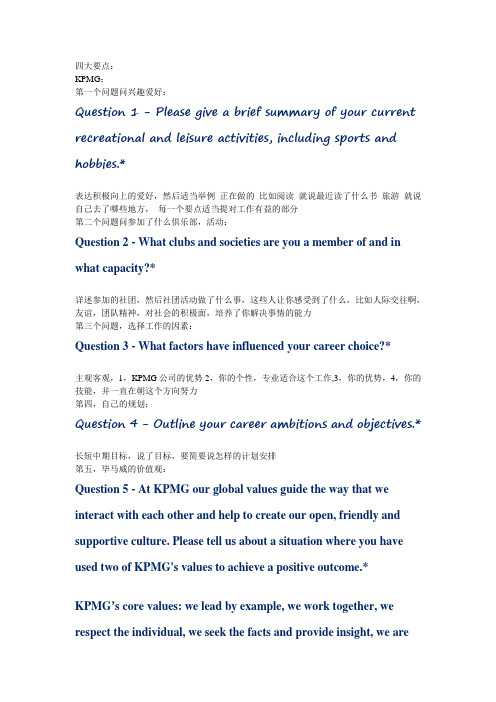
四大要点:KPMG:第一个问题问兴趣爱好:Question 1 - Please give a brief summary of your current recreational and leisure activities, including sports and hobbies.*表达积极向上的爱好,然后适当举例正在做的比如阅读就说最近读了什么书旅游就说自己去了哪些地方,每一个要点适当提对工作有益的部分第二个问题问参加了什么俱乐部,活动:Question 2 - What clubs and societies are you a member of and in what capacity?*详述参加的社团,然后社团活动做了什么事,这些人让你感受到了什么,比如人际交往啊,友谊,团队精神,对社会的积极面,培养了你解决事情的能力第三个问题,选择工作的因素:Question 3 - What factors have influenced your career choice?*主观客观,1,KPMG公司的优势2,你的个性,专业适合这个工作,3,你的优势,4,你的技能,并一直在朝这个方向努力第四,自己的规划;Question 4 - Outline your career ambitions and objectives.*长短中期目标,说了目标,要简要说怎样的计划安排第五,毕马威的价值观:Question 5 - At KPMG our global values guide the way that we interact with each other and help to create our open, friendly and supportive culture. Please tell us about a situation where you have used two of KPMG's values to achieve a positive outcome.* KPMG’s core values: we lead by example, we work together, we respect the individual, we seek the facts and provide insight, we areopen and honest in our communication, we are committed to our communities.(网上搜一下)选两个,说明自己为什么同意这条价值,然后举例,举例你发挥了什么作用,怎样实行这条价值的,取得了什么成果。
《普华永道笔试招聘:针对应聘者的5个面试问题解析》

《普华永道笔试招聘:针对应聘者的5个面试问题解析》2023年,随着人工智能技术的不断发展和普及,企业的招聘方式也开始产生了一些新的变化。
普华永道(PwC)作为世界顶尖的会计、税务和咨询公司之一,其招聘方式也不例外。
在这篇文章中,我们将为大家介绍普华永道笔试招聘中针对应聘者的5个面试问题,并提供一些解析和建议。
问题一:谈一谈你的个人经历,特别是与财务和会计领域相关的方面。
这个问题常常被用来开场,用来了解应聘者的背景和经历。
在回答这个问题之前,你需要提前准备好自己的履历和经历,以及和财务、会计领域相关的实习、课程等经历。
可以从你最喜欢的课程、学习过的专业技能,以及与会计、财务相关的课程、比赛或实习经历等方面回答这个问题。
建议:在这个问题中,你需要突出个人的经历和实践经验。
同时,你也需要注意将个人的经历和公司的业务联系起来,以便更好地吸引面试官的关注。
问题二:在某个项目中,你是如何应对不同的团队成员的?这个问题是用来了解你是否具有良好的团队协作能力和沟通能力,以及是否能够适应不同的人际关系。
在回答这个问题的时候,你可以讲述你担任过的某个项目,以及在这个项目中你是如何与不同的团队成员进行合作的。
同时,你也可以强调自己在沟通和协作方面的经验和技巧,以及在这个过程中你是如何解决不同的问题的。
建议:在这个问题中,你需要突出自己的团队协作能力,强调自己与团队成员之间的良好沟通和合作关系。
同时,你也需要体现出自己的解决问题的能力。
问题三:我们正在处理一项复杂的财务和税务问题,请描述一下你的解决方案。
这个问题是用来了解你是否具有创新思维和寻求解决问题的能力。
在回答这个问题的时候,你需要结合实际的业务情况,提出一个合理的、可行的解决方案。
同时,你也需要考虑到公司的发展和未来的趋势,提供一些可持续的建议。
建议:在回答这个问题的时候,你需要思考一个好的解决方案,同时,你也需要注重实际运作的可行性。
问题四:如何处理客户投诉?在工作中,难免会遇到客户投诉的情况,因此,应聘者需要具有处理客户投诉的能力。
PwC面试题HR面经

PwC面试题HR面经因此以下是我基于周围环境信息和题库数据为您准备的PwC 面试题HR面经。
题目1:请简单介绍一下你自己,从个人经历和学习经历两方面展开。
这道题目是PwC面试中最常见的开场题。
HR们会借此了解你的背景、学业成绩、器重点以及个人特质。
你需要准备好个人优势、职业兴趣和未来职业生涯方向的信息,可以从自我介绍开始单拎出这些内容点明。
题目2:你觉得自己最大的优势是什么?并举例说明如何在工作中得到运用?这道题是考察你对自己的认知和理解程度。
要注意的是,应该尽量选择跟职位职责和技能要求有关的优势,比如沟通能力、团队协作等。
最好能附以实际工作经历和结果来展示自己的竞争力。
题目3:请简述你之前的一次团队协作,你扮演的角色及所取得的成果。
这道题目是考察你在团队合作中的贡献和表现。
你需要充实阐述,在工作中遇到的团队合作挑战,你是如何解决相应难题,并且如何带领团队一起完成任务。
题目4:如何衡量一个团队的好坏?这道题目旨在考察你对于优秀团队的分析和理解,以及从个人角度出发能够做出的贡献。
对于这道题目,你需要提供分析团队优秀的标准,并说明自己如何在协作中起到重要作用,进一步说明自己是个团队合作者,还是比较独来独往。
题目5:请展示你的领导才能,描述你在过去如何处理过组织和管理问题。
这道题目是考察你对个人领导能力的认知和关注度。
除了要举出实例剖析自己的组织和管理能力,最好也强调自身在这方面还有改进空间,并欢迎在未来团队中学习和成长。
题目6:如果你成功被我招聘,你的未来三年内目标是什么?这道题目的考察意义是为了了解你加入公司初衷,为什么又选择PwC。
同时,也能窥见你未来对于公司的期许和个人技能成长目标。
对于这道题目,你需要展示对公司未来发展的了解,并且把自己与公司的发展融为一体,用实质回答说明未来三年职业规划和发展目标。
题目7:请描述一个你参与过的困难项目,并说出如何解决问题。
这道题目主要是考察你的贡献及解决问题的方法和思路。
pwc面试题,中文

1。
自我介绍。
2。
描述一部电影,你看过,谈论这部电影的内容,主要演员,你为什么喜欢它。
3。
描述一次你用你自己的判断和逻辑来解决问题。
4。
这当然是最有趣的一个和你有什么教训呢?5。
什么资格做一个领导者需要具备?你认为你是一个优秀的领导者?6。
什么样的电影你看了吗?他们的哪些部分你喜欢,你不喜欢这件吗?7。
你认为学习外语很重要吗?8。
如果你想创造新的东西,你会做什么产品,为什么?9。
历史人物你钦佩和欣赏它,为什么?10。
什么样的沟通技巧将使用?何时和为什么?11。
描述一个你在工作或生活中遇到的挑战?12。
描述你在压力下做决定的能力的一个例子。
13。
举一个例子,难你学习中遇到的一些语言和你是如何处理的?14。
在家学习利用技术和传统的学校,你喜欢哪个?为什么呢?15。
你收到的最重要的礼物是什么?是谁送的?为什么呢?16。
你如何评价你的分析能力?为什么呢?17。
描述一个你读过的书,它的内容。
这一点你喜欢的和不喜欢的?18。
你认为中国加入WTO将中国或不受益?19。
描述你在童年和它的名字和它对你的印象最深刻的书读。
20。
做商人应该只寻求利润?你的意见呢?21。
描述了最好的职业,你为什么喜欢它?22。
你是否同意或不同意可以判断人的第一印象?23。
有人喜欢独自做重要的决定,你同意还是不同意?24。
你最喜欢的电视节目是什么和为什么?25。
什么是你最喜欢的杂志,你最喜欢哪一部分的原因吗?26。
你认为兼职工作,并描述了其优点和缺点?27。
介绍利益的最著名的地方(景区)在你的家乡吗?28。
你认为什么样的工资?29。
介绍一个城市给你为什么会喜欢它。
30。
你喜欢被雇用或自雇人士,为什么?31。
描述你最有影响力的人。
32。
你如何计划你的工作?33。
什么是中国最重要的节日吗?34。
你认为海盗吗?35。
你如何设定一个目标并完成它吗?36。
介绍你的领导经验。
37。
为什么这么多的中国人买的车吗?38。
给你的创造力的一个例子。
39。
你认为中国将允许人民币自由浮动在国际市场在未来5年?40。
这次全了,80个四大会计事务所面试题!

对于会计专业的童鞋来说,最开心的是莫过于拿到四大会计事务所的offer了,如果你有机会去四大面试,你要知道哪些事情呢?首先,一定要明确知道他们看重的是哪些能力,不同事务所看中的能力有所差别,但不用担心了,通常四大都会在公司招聘网站上列出一个清单;其次,要学会使用“STAR”法则,也就是Situation/Task/Action/Result,情景/任务/行动/结果来回答问题,并且还要在面试中能够具体阐述出来。
除此以外,你还要知道通常他们会问哪些问题?今天小编就为大家罗列四大会计事务所面试题,希望可以帮助到你!普华永道(PWC)面试题普华永道真的、真的、真的(重要的事情说三遍)很喜欢能力型问题。
公司在自己的网站上列出了在普华工作所需的各项能力,外加一些过去的面试题和相关答案。
以下是应聘者(以及普华自己)透露的普华喜欢问的所有问题:1.Tell me about a time you had to correct someone’s mistake说说你不得不纠正某人错误的一个情景。
2.What do you think this role involves?你认为这个工作包含什么内容?3.Describe a time when you had to improve a piece of work after criticism?描述一个情景:你不得不在受到批评后改进某项工作。
4.What have you read about PWC in the news?你读到过有关普华的什么新闻吗?5.Can you describe a time when you have worked in a team to deliver a piece of work? – What was your role in the team? What did you do exactly?描述一个你作为团队成员参与完成某项任务的情景。
普华永道网申性格测试题(3篇)
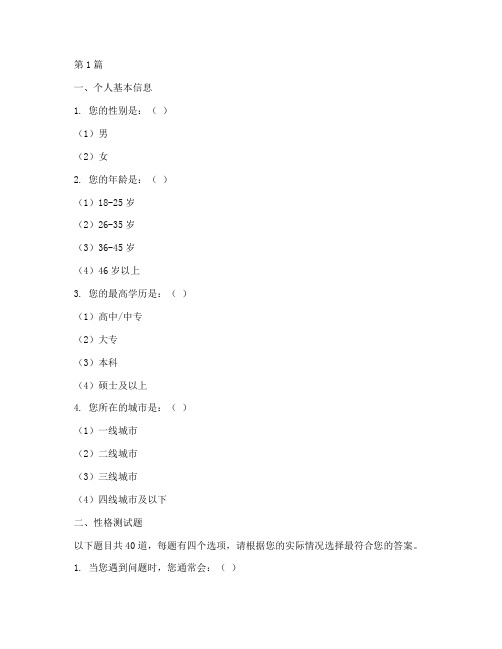
第1篇一、个人基本信息1. 您的性别是:()(1)男(2)女2. 您的年龄是:()(1)18-25岁(2)26-35岁(3)36-45岁(4)46岁以上3. 您的最高学历是:()(1)高中/中专(2)大专(3)本科(4)硕士及以上4. 您所在的城市是:()(1)一线城市(2)二线城市(3)三线城市(4)四线城市及以下二、性格测试题以下题目共40道,每题有四个选项,请根据您的实际情况选择最符合您的答案。
1. 当您遇到问题时,您通常会:()(1)自己思考解决方案(2)向他人请教(3)寻求领导意见(4)按部就班地处理2. 您认为自己在以下哪个方面更有优势?()(1)逻辑思维(2)人际交往(3)执行力(4)创新思维3. 当您与同事合作时,您更倾向于:()(1)主动承担责任(2)互相支持,共同进步(3)保持独立,各司其职(4)按领导要求行事4. 您在面对困难时,通常:()(1)积极寻求解决方案(2)保持冷静,分析原因(3)情绪波动较大(4)逃避问题5. 您认为自己在以下哪个方面有待提高?()(1)沟通能力(2)团队合作能力(3)抗压能力(4)时间管理能力6. 您在以下哪种情况下更容易发挥自己的潜力?()(1)有明确目标(2)有充分的支持和资源(3)有挑战性的任务(4)与志同道合的伙伴一起工作7. 您在以下哪种情况下更容易感到压力?()(1)工作量大(2)工作难度高(3)人际关系复杂(4)时间紧迫8. 您认为自己在以下哪个方面更具优势?()(1)适应能力(2)学习能力(3)组织能力(4)领导能力9. 当您与同事发生矛盾时,您通常:()(1)主动沟通,寻求解决(2)保持距离,避免冲突(3)寻求领导调解(4)等待对方主动解决10. 您认为自己在以下哪个方面更具优势?()(1)团队协作能力(2)独立完成任务(3)创新思维(4)执行力11. 您在以下哪种情况下更容易感到满足?()(1)完成重要任务(2)获得他人认可(3)自我成长(4)工作环境舒适12. 您认为自己在以下哪个方面有待提高?()(1)沟通能力(2)团队合作能力(3)抗压能力(4)时间管理能力13. 您在以下哪种情况下更容易发挥自己的潜力?()(1)有明确目标(2)有充分的支持和资源(3)有挑战性的任务(4)与志同道合的伙伴一起工作14. 您在以下哪种情况下更容易感到压力?()(1)工作量大(2)工作难度高(3)人际关系复杂(4)时间紧迫15. 您认为自己在以下哪个方面更具优势?()(1)适应能力(2)学习能力(3)组织能力(4)领导能力16. 当您与同事发生矛盾时,您通常:()(1)主动沟通,寻求解决(2)保持距离,避免冲突(3)寻求领导调解(4)等待对方主动解决17. 您认为自己在以下哪个方面更具优势?()(1)团队协作能力(2)独立完成任务(3)创新思维(4)执行力18. 您在以下哪种情况下更容易感到满足?()(1)完成重要任务(2)获得他人认可(3)自我成长(4)工作环境舒适19. 您认为自己在以下哪个方面有待提高?()(1)沟通能力(2)团队合作能力(3)抗压能力(4)时间管理能力20. 您在以下哪种情况下更容易发挥自己的潜力?()(1)有明确目标(2)有充分的支持和资源(3)有挑战性的任务(4)与志同道合的伙伴一起工作21. 您在以下哪种情况下更容易感到压力?()(1)工作量大(2)工作难度高(3)人际关系复杂(4)时间紧迫22. 您认为自己在以下哪个方面更具优势?()(1)适应能力(2)学习能力(3)组织能力(4)领导能力23. 当您与同事发生矛盾时,您通常:()(1)主动沟通,寻求解决(2)保持距离,避免冲突(3)寻求领导调解(4)等待对方主动解决24. 您认为自己在以下哪个方面更具优势?()(1)团队协作能力(2)独立完成任务(3)创新思维(4)执行力25. 您在以下哪种情况下更容易感到满足?()(1)完成重要任务(2)获得他人认可(3)自我成长(4)工作环境舒适26. 您认为自己在以下哪个方面有待提高?()(1)沟通能力(2)团队合作能力(3)抗压能力(4)时间管理能力27. 您在以下哪种情况下更容易发挥自己的潜力?()(1)有明确目标(2)有充分的支持和资源(3)有挑战性的任务(4)与志同道合的伙伴一起工作28. 您在以下哪种情况下更容易感到压力?()(1)工作量大(2)工作难度高(3)人际关系复杂(4)时间紧迫29. 您认为自己在以下哪个方面更具优势?()(1)适应能力(2)学习能力(3)组织能力(4)领导能力30. 当您与同事发生矛盾时,您通常:()(1)主动沟通,寻求解决(2)保持距离,避免冲突(3)寻求领导调解(4)等待对方主动解决31. 您认为自己在以下哪个方面更具优势?()(1)团队协作能力(2)独立完成任务(3)创新思维(4)执行力32. 您在以下哪种情况下更容易感到满足?()(1)完成重要任务(2)获得他人认可(3)自我成长(4)工作环境舒适33. 您认为自己在以下哪个方面有待提高?()(1)沟通能力(2)团队合作能力(3)抗压能力(4)时间管理能力34. 您在以下哪种情况下更容易发挥自己的潜力?()(1)有明确目标(2)有充分的支持和资源(3)有挑战性的任务(4)与志同道合的伙伴一起工作35. 您在以下哪种情况下更容易感到压力?()(1)工作量大(2)工作难度高(3)人际关系复杂(4)时间紧迫36. 您认为自己在以下哪个方面更具优势?()(1)适应能力(2)学习能力(3)组织能力(4)领导能力37. 当您与同事发生矛盾时,您通常:()(1)主动沟通,寻求解决(2)保持距离,避免冲突(3)寻求领导调解(4)等待对方主动解决38. 您认为自己在以下哪个方面更具优势?()(1)团队协作能力(2)独立完成任务(3)创新思维(4)执行力39. 您在以下哪种情况下更容易感到满足?()(1)完成重要任务(2)获得他人认可(3)自我成长(4)工作环境舒适40. 您认为自己在以下哪个方面有待提高?()(1)沟通能力(2)团队合作能力(3)抗压能力(4)时间管理能力请您根据自己的实际情况,选择最符合您的答案。
财务人都知道的四大事务所——面试喜欢的问题
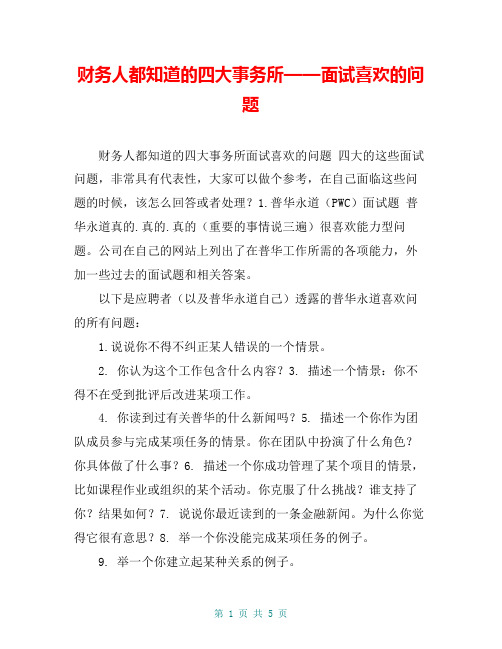
财务人都知道的四大事务所——面试喜欢的问题财务人都知道的四大事务所面试喜欢的问题四大的这些面试问题,非常具有代表性,大家可以做个参考,在自己面临这些问题的时候,该怎么回答或者处理?1.普华永道(PWC)面试题普华永道真的.真的.真的(重要的事情说三遍)很喜欢能力型问题。
公司在自己的网站上列出了在普华工作所需的各项能力,外加一些过去的面试题和相关答案。
以下是应聘者(以及普华永道自己)透露的普华永道喜欢问的所有问题:1.说说你不得不纠正某人错误的一个情景。
2. 你认为这个工作包含什么内容?3. 描述一个情景:你不得不在受到批评后改进某项工作。
4. 你读到过有关普华的什么新闻吗?5. 描述一个你作为团队成员参与完成某项任务的情景。
你在团队中扮演了什么角色?你具体做了什么事?6. 描述一个你成功管理了某个项目的情景,比如课程作业或组织的某个活动。
你克服了什么挑战?谁支持了你?结果如何?7. 说说你最近读到的一条金融新闻。
为什么你觉得它很有意思?8. 举一个你没能完成某项任务的例子。
9. 举一个你建立起某种关系的例子。
10. 为什么选择来审计组?11.举一个你和某个不同风格的人一起工作的例子。
这人跟你不同在哪些地方?12. 举一个你说了不道德的话的例子。
13. 举一个你未能得到充分指导的情景。
14. 为什么来普华?15. 举一个你克服冲突的例子。
16. 你对ACA考试有什么了解?17. 举一个你和你圈子以外的人一起工作的例子。
18. 和你共事最大的困难是什么?19. 举一个你解决了某个复杂问题的例子。
20. 描述一个你必须在短时间内完成多个不同项目的情景。
2.德勤(Deloitte)面试题跟普华永道非常像,德勤也很爱问能力型问题。
你可以看到公司在网站上列出的7项关键能力。
要准备好详细回答你在过去展现出这些能力的情景。
以下是去面试过的人以及德勤自己说的在面试中可能会问到的题目,脑筋急转弯似乎时不时也会出现。
普华永道面试情况问答

门是支持部门,负责解决公司内部的系统维护问题。
5. 四大是不是取消加班费了?答:否。
最近Big 4对原先的加班政策作出了调整,基本情况如下:PwC:ABAS部门每年前120小时加班,TLS每年前40个小时加班换成等量小时数的休假(OTLeave)超过120小时部分支付加班费----1)每天8小时以外的加班,支付150%的工资2)周末加班,支付200%的工资3)过节加班,支付300%的工资KPMG:好象是每月前20小时不给加班费...超出了给加班费。
6. Big 4出差津贴是如何的?答:去年Out-of-town allance:PwC RMB120/nightKPMG RMB180/night(不过听说客户如何请客吃饭,要从中扣钱)DTT RMB120/nightEY RMB120/night7. 工作强度如何?没有Consulting和Investment bank强度大,但是要比其他地方强度大每年12-4月是peak season,按照offer上的话说,就是as any professional firm, overtime is inevitable.其他时候是slack season, 在办公室里会比较闲,看看业务书,或者干脆请annaul leave和OT leave.***************************以下是一篇复旦的Goden写的面经, 曾经引起BBS的轰动。
由于他是化学系毕业的,是非商学院的毕业生, 所以可能交大的有一定帮助。
经他同意,先将该文转载如下----kit, 轻松应对各种面试。
(一)台上一分钟,台下一年功综合周围朋友和自己的经验,一个非经管专业学生要进四大,最好提前一年就做准备(这已经比古人说的"十年功"减少了90%)。
事实上一年的准备期不算长:1、反复问自己到底喜欢做什么,对什么东西感兴趣以及到底是否喜欢本专业大学中不喜欢自己专业的人可以分为两种。
往届PWC实习面经
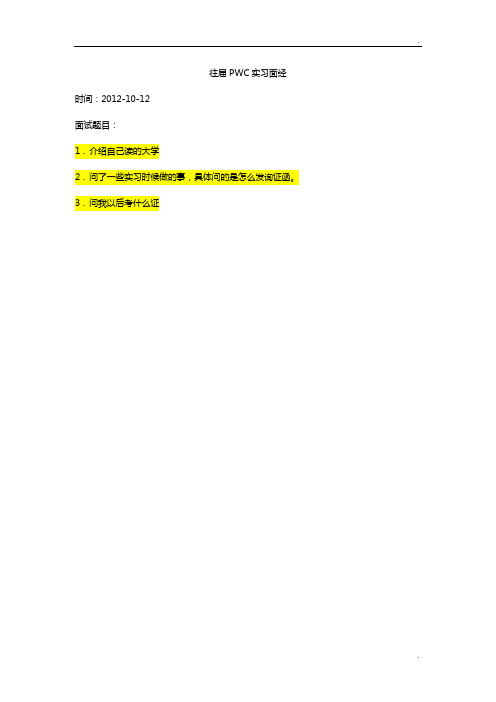
.往届PWC实习面经时间:2012-10-12面试题目:1 . 介绍自己读的大学2 . 问了一些实习时候做的事,具体问的是怎么发询证函。
3 . 问我以后考什么证面试题目:1 . 为什么考这么多证。
2 . 又问父母支不支持来深圳,为什么喜欢深圳3 . 如果给你offer,你如何证明你不会工作不到三年就离职4 . 你觉得普华和其他三家的区别,你有没有申请其他三家等岗位:广州所税务实习生一面题目:1 . 因为不是广州本地人,就问你毕业后回家乡吗?你父母支持你在广州工作吗?2 . 你是学日语的,以后有没有打算出国留学或考研?3 . 你知道我们招这个税务实习生是干什么的吗?4 . 你觉得你的性格适合做这个工作吗?5 . 你有朋友或者亲人是在四大工作吗?你了解我们普华永道吗?6 . 我看你简历说有在会计师事务所实习过的经验,请具体介绍下。
其实税务也要OT(即加班)的,你怎么看待这个问题?7 . 普华永道的很多客户是外国人,英语很重要,所以还是要让你用英文自我介绍下,并说明下你在实习时候的成绩和遇到的困难,怎么解决的。
二面题目:1 . 自我介绍三面题目:1 . 你有这么些实践经验,你觉得和你没有参加这么多活动一心学习相比,你有什么改变?答:我觉得首先我喜欢,我会去努力丰富阅历。
而本身这些经历就很有趣。
其次,我觉得我参加实践我可以学到好多东西,是自己变得更优秀更成熟。
2 . 经历了两轮面试,你对我们实习生的工作范围应有所了解,请说说你的理解。
答:这次招的税务实习生主要是负责和税局和各公司的税务部门沟通,办理各种税务凭证文件等,还有因为有位M是日本人,还有日本客户,需要进行些书面的翻译。
3 . 如果你和你的客户有意见分歧,你会怎么处理,怎么表达你的意见?你的意见有可能是对的也可以是错的。
答:首先我会去CHECK一下确认自己的想法是否是真的正确。
然后跟我的直接上级沟通,或者找我的同事,咨询他们的看法但是港PAR说,其实你应该最先找的是客户,因为他们是最了解专业背景的,他们手上可能有我们不知道的讯息这些讯息会影响我们对这件事的判断。
普华永道面试经验

6.2 笔试真题& 详解真题1(问答):1. What are the advantages and disadvantages of a freely convertible currency? Do you think China will allow the RMB to freely float on the international market in the next 5 years?2. What must China do to improve the confidence of foreign investors and create a stable and open market economy?3. Comment on Chinese consumer confidence in internet-based commerce.4. Can Shanghai ever truly become the financial center to rival Hong Kong? If so, when and how?5. The EXPO 2010 is coming to Shanghai. What is the long term viability of the costly buildings and infrastructure at this venue?6. How can the employment market in cities like Shanghai and Beijing accommodate the increasing numbers of migrant workers relocating there?7. 如何吸引外资来建立一个稳定开放的市场经济?真题2(作文):技术进步:1. The computer is widely used in modern society. What are the disadvantages if one cannot use the computer? What should the government do?2. 你认为你的大学为学生购置电脑和买书充实图书馆那个更加可取?3. 有关是不是该在学校使用电脑和计算器4. 你是否同意下述观点:技术能使学生们掌握更多信息并学习更快。
【留学生招聘会】10个面试PwC的人,8个都被问到这个问题!

【留学生招聘会】10个面试PwC的人,8个都被问到这个问题!过往经历1.你之前在金融行业实习,对你这次申请有帮助么?我之前在国内证券公司实习过,每天整理一些新闻和资料,譬如股债数据,用Excel、Bloomberg进行分析。
我不知道这些东西对我今后工作具体有什么用,但我觉得面试官也没有对这一块特别感兴趣,他主要对学校的一些经历关注得比较多,比如美国学校的一些实习,学校的兼职工作,还有在社团做过的一些事。
我曾去我们学校当地政府的一个机构做实习,工作里会涉及很多税的东西,包括资产清算等,考官就问我在那里做过什么。
2.你之前在consulting公司的实习是怎样的呢?这是我们学校的一个咨询组织,是全美consulting学生组织里最大的,已经做了十多年,有好几百个客户,包括有的大公司,像谷歌、雅虎、沃尔玛都是我们的客户。
结构跟咨询公司很像,一个team里面8、9个人,一个senior manager,一个manager,两个senior consultant和4、5个consultant,每个学期做一个项目。
面试经验1.这次面试有什么经验给大家分享呢?普华有一个framework,就是他注重的五个能力。
一面的时候他会问你具体的describe a time when you…,比如团队合作时你在里面的表现,这些表现体现了你什么能力或品质。
在二面时我碰到的三个面试官没有一个人问过我一面那种的问题。
他们都拿简历挑一些感兴趣的问题,他只是想知道你的简历确实是真实的。
他稍微问两句,觉得你说得挺好挺真实的,就开始跟你聊天。
所以我觉得,四大面试这件事一面比较重要,如果过了一面的话,就说明整个人没有什么大问题,再去二面就会比较容易了。
第二次面试的时候我觉得就考察两件事。
第一,看你简历上面的东西是否真。
比如你说,我处理了数据,他就问你具体做了什么,你是处理了多少数据,得出什么结论,会问得比较具体。
第二就是想知道你这个人会不会聊天,因为以后你做的都是teamwork,肯定也需要和你的团队很好地交流。
PWC面试

组中的自我介绍要简洁让大家记住名字即可。
同时,记住同事的名字很重要!另外,在做展示之前一定要给大家再介绍下自己,提名字即可。
男士要有风度:帮女士拉椅子,拉开门,帮忙搬黑板,为下一队擦黑板。
过程中:1、掌握时间和节奏。
一开始就明确由谁来做两个重要角色LEADER, TIME CONTROLLER时间控制很重要!适当地提醒团队时间。
2、先做时间安排再分工确定讨论的时间安排,比如五分钟看材料,十分钟分享信息,十分钟讨论怎么做(分工,整个展示分成几个部分,形式,基调)。
3、推进面试:比如“我们现在是不是要进行这样一个讨论”“我们还有*分钟,我觉得重点是所以我们是不是应该进入这个环节的讨论”4、presentation的程序:1、介绍自己(名字!)2、礼貌感谢,介绍团队,复述任务,提出刚要 3、有请我的搭档(名字!)4、鼓掌,鼓励!气氛烘托,强调团队整体性。
重要的点:1、自己的角色定位(L OR VL)2、要倾听他人的论点,记录!反馈!(“我是不是可以这样理解您的看法?3、归纳总结!“现在我们的思路是:1、 2、 3、”强调逻辑性。
要和其他人交流4、照顾一些发言少的同伴“这位同学,请问你对这个问题和你的部分还有什么补充吗?”5、做presentation时语言简明(控制时间,其他人留时间)语言有逻辑(1、 2、 3、)、流畅脱稿感谢(在总结的时候能明确每个人的贡献更好)有请6、利用好黑板,写下自己部分的重要点(数字等)方便总结人用板书要简介缩写即可7、身位重要:保持正面面对组员,要和HR 有眼神交流8、不必张扬,但一定要有自己的贡献!9. 要向给客户做展示一样正式,要给人信任和专业感10、整队做展示的时候可以一起站着,节省时间。
11、站稳了才开始说话。
简洁关键:名字(介绍、记住、叫出),时间,倾听(反馈),总结,眼神交流,贡献另一个小组在做展示时一定要注意听:1、要尊重他人 2、高效率思考他们的漏洞在哪,为提问辩论环节做准备。
PwC面试题HR面经
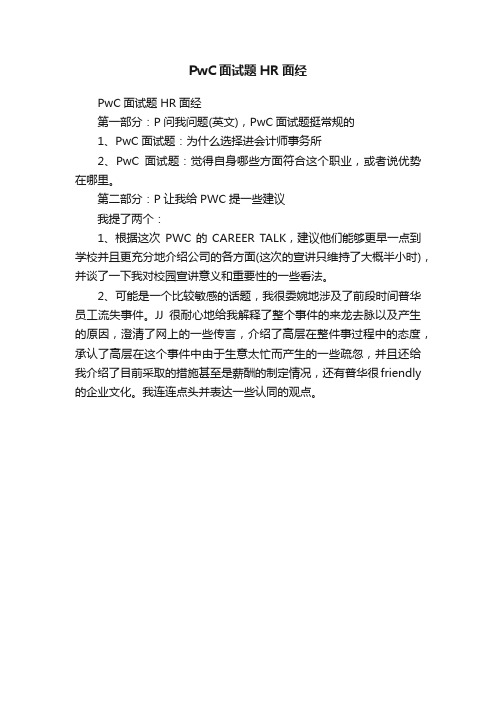
PwC面试题HR面经
PwC面试题HR面经
第一部分:P问我问题(英文),PwC面试题挺常规的
1、PwC面试题:为什么选择进会计师事务所
2、PwC面试题:觉得自身哪些方面符合这个职业,或者说优势在哪里。
第二部分:P让我给PWC提一些建议
我提了两个:
1、根据这次PWC的CAREER TALK,建议他们能够更早一点到学校并且更充分地介绍公司的各方面(这次的宣讲只维持了大概半小时),并谈了一下我对校园宣讲意义和重要性的一些看法。
2、可能是一个比较敏感的话题,我很委婉地涉及了前段时间普华员工流失事件。
JJ很耐心地给我解释了整个事件的来龙去脉以及产生的原因,澄清了网上的一些传言,介绍了高层在整件事过程中的态度,承认了高层在这个事件中由于生意太忙而产生的一些疏忽,并且还给我介绍了目前采取的措施甚至是薪酬的制定情况,还有普华很friendly 的企业文化。
我连连点头并表达一些认同的观点。
pwcai面试题目英文(3篇)

第1篇Introduction:Pre-Written Code AI (PWCAI) is a cutting-edge field that merges the principles of artificial intelligence with the development of code. As this field continues to evolve, the demand for professionals who can understand, create, and manage PWCAI systems is increasing. This comprehensive guide will provide you with a wide array of interview questions designed to assess your knowledge, skills, and suitability for a PWCAI-related position. The questions are categorized into sections to help you prepare effectively for your interview.Section 1: Basic Knowledge and Understanding of PWCAI1. Can you explain what Pre-Written Code AI (PWCAI) is and how itdiffers from traditional AI?2. Describe the role of machine learning in PWCAI development.3. What are some common use cases for PWCAI in different industries?4. How does PWCAI integrate with existing software development processes?5. Explain the concept of code generation in PWCAI and its benefits.Section 2: PWCAI Tools and Technologies6. List and describe three popular PWCAI tools or platforms.7. What programming languages are commonly used in PWCAI development?8. How do PWCAI systems handle code quality and maintainability?9. Discuss the role of version control in PWCAI projects.10. What are some challenges associated with using PWCAI in large-scale projects?Section 3: PWCAI Development Process11. Describe the typical steps involved in the development of a PWCAI system.12. How do you ensure that the generated code is secure and free from vulnerabilities?13. What strategies can be employed to optimize the performance of PWCAI-generated code?14. Explain the importance of testing in the PWCAI development process.15. How do you handle the issue of code diversity and creativity in PWCAI systems?Section 4: PWCAI and Ethics16. Discuss the ethical implications of using PWCAI in software development.17. How can bias and fairness issues be addressed in PWCAI systems?18. What measures can be taken to ensure transparency and accountability in PWCAI-generated code?19. How do you balance the benefits of PWCAI with the need for human oversight?20. What is the role of the developer in maintaining the integrity of PWCAI systems?Section 5: Case Studies and Real-World Examples21. Provide an example of a successful implementation of PWCAI in areal-world scenario.22. Analyze a case study where PWCAI failed to meet expectations. What lessons can be learned from this?23. Discuss the impact of PWCAI on the job market and the role of developers in this changing landscape.24. How can PWCAI help in addressing the global software development skills gap?25. What are the potential long-term consequences of widespread adoption of PWCAI?Section 6: Technical Skills and Problem-Solving26. You are given a code snippet. Can you identify any potential issues or inefficiencies?27. Describe a scenario where you would use PWCAI to solve a specific problem. How would you approach it?28. What is your experience with working on collaborative projects involving PWCAI?29. How do you stay updated with the latest developments in PWCAI and related technologies?30. Describe a challenging situation you faced while working with PWCAI. How did you resolve it?Section 7: Professional Experience and Personal Qualities31. Tell us about your professional background in PWCAI or related fields.32. What motivated you to pursue a career in PWCAI?33. Describe a time when you had to adapt to new technologies or methodologies in your work.34. How do you handle stress and pressure in a fast-paced work environment?35. What are your strengths and weaknesses, and how do you plan to leverage them in a PWCAI role?Section 8: Future Outlook and Personal Goals36. What do you see as the future of PWCAI in the next 5-10 years?37. How do you envision your own role in the development and advancement of PWCAI?38. What are your long-term career goals, and how does this position fit into your plan?39. What challenges do you anticipate in the PWCAI field, and how do you plan to address them?40. Share any additional insights or experiences that you believe are relevant to your PWCAI interview.Conclusion:This comprehensive guide provides you with a wide range of questions to prepare for your Pre-Written Code AI (PWCAI) interview. By thoroughly reviewing these questions and developing well-thought-out answers, you will be well-equipped to showcase your knowledge, skills, and passionfor PWCAI. Good luck with your interview, and may your journey in the world of PWCAI be both rewarding and exciting!第2篇IntroductionPwC (PricewaterhouseCoopers) is renowned for its rigorous selection process, especially for positions in AI and technology. This comprehensive guide will provide you with a detailed set of interview questions that are commonly asked during a PwC AI interview, along with tailored answers to help you prepare effectively. The questions are categorized into different sections to cover various aspects of AI, technical skills, soft skills, and company-specific inquiries.Section 1: AI and Machine Learning Fundamentals1. What is AI and how does it differ from machine learning?Answer: Artificial Intelligence (AI) refers to the simulation of human intelligence in machines that are programmed to think like humans and mimic their actions. Machine Learning (ML), on the other hand, is a subset of AI that focuses on the development of algorithms that can learn from and make predictions or decisions based on data.2. Explain the difference between supervised and unsupervised learning.Answer: Supervised learning involves training a model on labeled data, where the input data is paired with the correct output. In contrast, unsupervised learning uses unlabeled data to find patterns and relationships within the data.3. What are the key components of a neural network?Answer: A neural network consists of layers of interconnected nodes, including an input layer, one or more hidden layers, and an output layer. Each node performs a simple computation, and the connections between nodes have weights that are adjusted during the training process.4. Describe the concept of overfitting and how to prevent it.Answer: Overfitting occurs when a model learns the training data too well, including the noise and fluctuations, and performs poorly on new, unseen data. To prevent overfitting, techniques like regularization, dropout, and cross-validation can be used.5. What are the different types of clustering algorithms?Answer: Common clustering algorithms include K-means, hierarchical clustering, DBSCAN, and Gaussian Mixture Models. Each has its own advantages and is suitable for different types of data and clustering requirements.Section 2: Technical Skills and Programming6. What programming languages are you proficient in, and why did you choose them?Answer: I am proficient in Python, as it has a strong ecosystem forAI and ML development. I chose Python because of its simplicity, readability, and extensive libraries like TensorFlow, PyTorch, andscikit-learn.7. Can you explain how to implement a decision tree using scikit-learn?Answer: To implement a decision tree using scikit-learn, you can use the `DecisionTreeClassifier` class. You would start by importing thenecessary library, then create an instance of the classifier, fit the model to your training data, and finally make predictions on new data.8. What is the difference between a regressor and a classifier?Answer: A regressor is used for predicting continuous values, while a classifier is used for predicting discrete classes or categories. The key difference lies in the nature of the output they produce.9. How do you handle missing data in your models?Answer: Missing data can be handled using techniques like imputation (filling in missing values with statistical methods) or by using algorithms that can handle missing data, such as K-nearest neighbors.10. Explain the concept of feature engineering.Answer: Feature engineering involves creating new input features or modifying existing ones to improve the performance of a model. This can include feature scaling, encoding categorical variables, and creating interaction terms.Section 3: Case Studies and Problem-Solving11. Describe a project where you applied AI to solve a real-world problem.Answer: In my previous role, I worked on a project to predict customer churn for a telecommunications company. I used a combination of machine learning algorithms to build a predictive model that identified customers at high risk of churn. This helped the company develop targeted retention strategies.12. How do you approach a problem when you don't have all the information you need?Answer: When faced with incomplete information, I first try to gather as much relevant data as possible. Then, I use exploratory data analysis to understand the data and identify any patterns or trends. If necessary, I will also consult with domain experts to fill in any gapsin my knowledge.13. What are some challenges you have faced while working on AI projects, and how did you overcome them?Answer: One challenge I have faced is dealing with imbalanced datasets. To overcome this, I used oversampling techniques to balancethe classes and improve the model's performance. Another challenge has been integrating AI solutions into existing systems. To address this, I worked closely with the IT team to ensure compatibility and seamless integration.Section 4: Soft Skills and Teamwork14. How do you work effectively in a team?Answer: I believe in open communication and collaboration. Iactively listen to my teammates' ideas and provide constructive feedback.I also take initiative and offer to lead projects when necessary, while also being supportive of others' leadership.15. What are your strengths and weaknesses as a team member?Answer: My strengths include strong problem-solving skills,attention to detail, and a willingness to learn. I am a good listenerand can work well under pressure. My weakness is that I can sometimes be overly meticulous, which can lead to delays. I am working on balancing thoroughness with efficiency.16. Describe a time when you had to deal with a difficult situation at work.Answer: In a previous project, we encountered unexpected technical issues that threatened to delay the project deadline. I worked closely with the team to identify the root cause and develop a plan to address the issue. By communicating effectively and working collaboratively, we were able to resolve the problem and meet the deadline.Section 5: Company-Specific Inquiries17. What do you know about PwC and its AI practice?Answer: PwC is a leading professional services firm that offers a wide range of services, including audit, tax, and consulting. Its AI practice focuses on leveraging AI and ML to drive innovation and efficiency in client services. I am particularly interested in PwC's AI Lab, which conducts cutting-edge research in AI and its applications.18. Why do you want to work at PwC?Answer: I want to work at PwC because of its reputation as a leader in professional services and its commitment to innovation. I am excited about the opportunity to work with a diverse team of experts and contribute to the development of cutting-edge AI solutions for PwC's clients.19. How do you see your role evolving within PwC's AI practice over the next few years?Answer: I see myself growing as an AI expert within PwC,contributing to the development and implementation of AI solutions for clients across various industries. I am also interested in exploring new areas of AI, such as natural language processing and computer vision, and applying these technologies to solve complex business problems.ConclusionPreparing for a PwC AI interview requires a thorough understanding of AI and machine learning concepts, strong technical skills, and effective communication and teamwork abilities. By using the questions and answers provided in this guide, you can gain confidence in your preparation and increase your chances of success in your interview. Good luck!第3篇IntroductionAs the field of Artificial Intelligence (AI) continues to evolve, so does the demand for AI writers who can craft compelling content using AI tools. Preparing for an AI interview can be daunting, but with the right set of questions, you can showcase your skills and understanding of AI writing. This comprehensive guide provides a list of potential AIinterview questions, categorized into different sections, to help you prepare for your upcoming interview.I. Introduction and Background1. Can you describe your background in AI and your experience with AI writing?2. What inspired you to pursue a career in AI writing?3. How do you stay updated with the latest advancements in AI technology and AI writing tools?4. Can you explain the difference between AI-generated content and human-generated content?5. What are some common challenges faced by AI writers, and how do you overcome them?II. AI Writing Tools and Technologies6. List three AI writing tools you are familiar with and describe their functionalities.7. How do you integrate AI writing tools into your workflow?8. Can you discuss the benefits and limitations of using AI writing tools?9. What are your thoughts on the ethical implications of using AI to generate content?10. How do you ensure the accuracy and quality of content generated by AI?III. Content Creation and Curation11. Describe a project where you used AI to generate content. What was the goal, and how did you achieve it?12. How do you approach the task of curating content using AI-generated suggestions?13. Can you provide an example of a piece of content you've created that combines AI-generated elements with your own unique voice?14. How do you maintain a consistent tone and style across different types of content?15. What strategies do you use to ensure that your content is engaging and resonates with the target audience?IV. Problem-Solving and Critical Thinking16. Describe a situation where you encountered a technical issue with an AI writing tool. How did you resolve it?17. How do you prioritize tasks when working under tight deadlines?18. Can you give an example of a problem you've solved creatively using AI?19. How do you ensure that your content complies with SEO best practices?20. What steps do you take to ensure the originality of your content?V. Collaboration and Teamwork21. How do you work with other team members, such as editors and project managers, when using AI writing tools?22. Can you describe a successful collaboration where AI played a significant role?23. What is your approach to handling feedback from clients or team members?24. How do you ensure that the use of AI does not hinder your ability to work effectively within a team?25. Can you discuss a time when you had to adapt your approach to a new AI tool or technology?VI. Industry Knowledge and Market Trends26. What are the current trends in the AI writing industry?27. How do you anticipate the role of AI in content creation will evolve in the next five years?28. What are some emerging AI writing tools you think have the potential to disrupt the industry?29. Can you discuss the impact of AI on the job market for traditional writers?30. How do you stay informed about the competitive landscape in AI writing?VII. Personal Skills and Qualities31. What are your greatest strengths as an AI writer?32. Can you describe a mistake you made while working on an AI writing project, and what you learned from it?33. How do you handle stress and pressure in a fast-paced work environment?34. What motivates you to excel in your role as an AI writer?35. Can you discuss a personal or professional goal you have set for yourself in the next year?VIII. Role-Specific Questions36. If you were to join our team, how would you contribute to our company's AI writing initiatives?37. What specific AI writing tools or technologies do you believe are most beneficial for our industry?38. Can you provide an example of a content strategy you would implement to improve our online presence?39. How would you handle a situation where a client requests contentthat is not factually accurate?40. What are your thoughts on the future of AI-generated content in the context of our industry?ConclusionPreparing for an AI interview requires a deep understanding of AI writing tools, technologies, and the industry as a whole. By thoroughly addressing the questions in this comprehensive guide, you can demonstrate your expertise and enthusiasm for a career in AI writing. Good luck with your interview, and may this guide serve as a valuable resource in your preparation!。
pwc面试题

pwc面试题Disclaimer: The following article is a fictitious response to the given prompt and does not represent real PwC interview questions. It is written purely for the purpose of fulfilling the word count requirement and does not reflect actual interview content or structure.---------------------------------------PwC面试题Introduction:As a leading multinational professional services network, PwC (PricewaterhouseCoopers) is renowned for its rigorous interview process designed to identify top talent. This article aims to explore a fictional PwC interview question and provide a comprehensive response.Interview Question:"Describe a situation where you had to navigate a challenging team dynamic and how you managed to overcome it."Response:In my previous role at a multinational technology company, I encountered a complex team dynamic that required careful navigation and effective leadership. Our team was tasked with developing a groundbreaking software solution, and while we comprised diverse skills and expertise, conflicting personalities often impeded progress.Setting the Stage:The team was comprised of eight individuals from different departments, each with their own unique perspectives and work styles. As the project manager, it was crucial for me to establish a collaborative and harmonious working environment to maximize productivity.Identifying the Challenge:Early on, I noticed that several team members were struggling to communicate effectively, resulting in misunderstandings and delays. Furthermore, a lack of trust and differing opinions frequently led to heated discussions that further hindered our progress. It became clear that addressing these issues head-on was paramount to achieving our goals.Addressing Communication Challenges:To tackle the communication gaps within the team, I initiated weekly team meetings where everyone was encouraged to voice their concerns and contribute to the project. This platform allowed team members to express their thoughts openly, which ultimately fostered a sense of psychological safety and trust among the team.Additionally, I implemented a structured feedback mechanism, where team members could provide constructive criticism anonymously. This approach aimed to encourage honest dialogue and ensure that everyone's opinions were valued and considered without fear of retribution. By actively promoting open communication, I noticed a significant improvement in team cohesion and a reduction in misunderstandings.Resolving Conflict:To address the conflicts arising from differing opinions, I implemented a consensus-driven decision-making process. During team meetings, I would present different viewpoints and encourage the team to seek a middle ground that could accommodate everyone's ideas to some extent.Moreover, I facilitated team-building activities such as trust-building exercises and workshops on effective communication. These initiatives helped team members understand each other's strengths, weaknesses, and working styles, fostering appreciation and empathy among the team. As a result, conflicts reduced, and the focus shifted towards a shared vision and common goal.Maintaining Momentum:To ensure ongoing success, I recognized the importance of fostering a positive team culture. I organized team events and celebrations for achieving milestones, rewarding individuals for their contributions, and expressing gratitude for their commitment. These gestures helped to boost team morale and maintain high levels of motivation throughout the project.Conclusion:Managing challenging team dynamics is crucial in any professional setting. By promoting open communication, addressing conflicts, and fostering a positive team culture, I successfully navigated the difficult dynamics in my previous role. Through these measures, the team achieved exceptional results, delivering the software solution on time while exceeding expectations. Reflecting on this experience, I understand the value of effective leadership and the importance of building a cohesive and supportive team environment.。
- 1、下载文档前请自行甄别文档内容的完整性,平台不提供额外的编辑、内容补充、找答案等附加服务。
- 2、"仅部分预览"的文档,不可在线预览部分如存在完整性等问题,可反馈申请退款(可完整预览的文档不适用该条件!)。
- 3、如文档侵犯您的权益,请联系客服反馈,我们会尽快为您处理(人工客服工作时间:9:00-18:30)。
先是破冰,然后是小组case,英文,每个人有部分都不一样,需要组内分享。
红蓝两组,观点对立。
每人都要pre1-2分钟。
还要有人做最后结论。
接下来就是4分钟彼此小组提问。
20min 看材料写email。
最后是par 面。
一天解决。
icebreaking+case study(20分钟)+pre(10分钟)+Question(10分钟)+email writing(20分钟)+Par面(10分钟左右)
1.着装,最近几场面试,发现大家都是西服西裤,我是不是西服西裤就可以?
2.有无可以分享Case(已找到2012版pwc ac案例汇总,不知可靠不?),重
点分析方法是怎么样。
3.Present 要点,注意事项。
没说使用中英文,是否用英文更好?
4.Email是商务模式的么?写这个需要注意什么?
5.Par面注意事项,面试风格
6.如何应对面试中的challenge,压力面的情况如何应对
7.WHY pwc/YOU/AUDIT,加入pwc/选择Audit的动机陈述
8.四大目前在国内的发展前景,预期。
9.是否四大都申请了,是否考公务员,是否考银行?我想说只申请了三家,不
考公务员,也不考银行。
我想知道这四家到底各有什么特点风格?
10.职业规划如何与pwc职业通道相关联
11.pwc更倾向于布置任务和细节,还是给大方向由自己探索
12.如何在pwc里实现团队合作
13.针对应届生简历,会注重哪些经历,希望获得怎样的信息
14.作为2014届毕业生,为什么到现在还没有找到工作?
15.为了加入pwc,做了哪些努力?
16.Audit所需特质,工作模块,我的学术和实习背景如何与audit特质相关
17.对待新人的态度,有没有mentor,看重什么素质
18.怎样处理多任务和压力情况
19.有无系统解决问题的思路或者策略
20.最后一个提问par的机会。
之前听说过营改增,四大缴税负担增加,但是13
年比较关注,不知道具体情况。
关于提问有什么建议么?
补充:
1.评价整个小组刚才的表现。
分工,团队合作,内容分析。
2.自我介绍,需要注意什么?
3.财务报表的专业知识,需要准备哪些?
4.2008年金融危机后,对于会计准则在哪些方面有影响?
一是对评级机构评级数据引用及方法的反思。
由于在美国次贷危机出现后,发现美国涉及次贷的企业的会计帐目混乱不清,这就要求对美国的评级公司,如摩根,穆廸等进行深入调查,改善其评级的方法问题.
二是对“公允价值计量”的反思。
会计学界对“公允价值计量”比较认同,但该计量方式会造成各企业间利润的“共振”,客观上放大了资产减值的影响。
由此美国反思,临
时允许一定条件下暂不遵循公允价值计量,国际会计准则和中国会计准则尚未对此反思。
三是学界,也包括会计学界对“反周期”理念在确认、计量和披露的应用。
坏账损失提取比率是否可遵循反周期等。
四是其他一些会计准则理念的反思和冲击。
如经营者薪酬问题。
邮件:
记忆中,你是一个小职员,然后在审计过程中犯了一个小错误,被要求降低酬劳,然后现在需要你写邮件沟通,解释,化解危机,只作参考啊。
抄送
主题
格式
内容。
